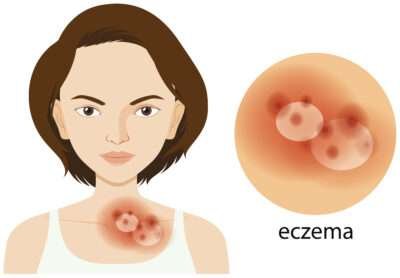Unlocking Nature’s Secret: Ayurvedic Treatment for Eczema Revealed!
Eczema, a common skin condition that causes itching, redness, and inflammation, affects millions of people worldwide. While conventional treatments can provide relief, many sufferers seek natural and holistic alternatives. This is where Ayurveda, an ancient Indian system of medicine, comes into play. Ayurveda offers a unique approach to managing eczema by addressing its root causes and promoting overall wellness.
Understanding Eczema: An Overview

Eczema, also known as atopic dermatitis, is a chronic condition characterized by dry, itchy, and inflamed skin. It can affect individuals of all ages, though it is particularly prevalent in children. Eczema is often linked to a malfunctioning immune system, environmental factors, and genetic predisposition.
The symptoms can range from mild to severe, with some experiencing periodic flare-ups that can significantly impact their quality of life. Traditional treatments typically include topical steroids, moisturizers, and antihistamines, but these may not always offer lasting relief and can have side effects.
The Ayurvedic Perspective on Eczema
In Ayurveda, eczema is known as Vicharchika and is believed to result from an imbalance in the body’s three doshas: Vata, Pitta, and Kapha. Specifically, eczema is often associated with an excess of Pitta and Kapha doshas, leading to inflammation and the buildup of toxins in the body. Ayurveda aims to restore balance through a combination of diet, lifestyle changes, herbal remedies, and detoxification practices.
Key Principles of Ayurvedic Treatment for Eczema
1. Balancing the Doshas
The first step in Ayurvedic treatment is identifying the dominant dosha imbalance. A qualified Ayurvedic practitioner can help determine whether Vata, Pitta, or Kapha is out of balance and tailor a treatment plan accordingly. This personalized approach ensures that the treatment addresses the specific needs of each individual.
2. Detoxification (Panchakarma)
Detoxification, or Panchakarma, is a cornerstone of Ayurvedic treatment. It involves a series of procedures designed to cleanse the body of toxins (Ama) and restore balance. Common Panchakarma therapies include:
- Vamana (therapeutic vomiting)
- Virechana (purgation)
- Basti (medicated enemas)
- Nasya (nasal administration of herbs)
- Raktamokshana (bloodletting)
These therapies help eliminate toxins, reduce inflammation, and improve overall health.
3. Herbal Remedies
Ayurveda utilizes a variety of herbs and natural ingredients to manage eczema. Some commonly used herbs include:
- Neem (Azadirachta indica): Known for its anti-inflammatory and antimicrobial properties.
- Turmeric (Curcuma longa): Contains curcumin, which has potent anti-inflammatory and antioxidant effects.
- Aloe Vera: Soothes and moisturizes the skin.
- Manjistha (Rubia cordifolia): Helps purify the blood and supports skin health.
- Guduchi (Tinospora cordifolia): Boosts immunity and reduces inflammation.
These herbs can be used in various forms, such as powders, oils, or pastes, and applied directly to the affected areas or taken internally.
4. Diet and Nutrition
A Pitta-pacifying diet is often recommended for eczema sufferers. This includes:
- Cooling foods: Such as cucumbers, leafy greens, and melons.
- Whole grains: Like barley, oats, and quinoa.
- Healthy fats: Including ghee and coconut oil.
- Hydrating fluids: Herbal teas, coconut water, and plenty of plain water.
Avoiding Pitta-aggravating foods like spicy, sour, and fried items is crucial. Reducing the intake of dairy, sugar, and processed foods can also help manage symptoms.
5. Lifestyle Modifications
Ayurveda emphasizes the importance of lifestyle changes to maintain dosha balance. Key recommendations include:
- Regular exercise: Gentle activities like yoga and walking.
- Adequate sleep: Ensuring 7-8 hours of restful sleep each night.
- Stress management: Techniques such as meditation, deep breathing, and spending time in nature.
- Skin care: Using natural, gentle skincare products and avoiding harsh chemicals.
Effective Ayurvedic Treatments for Eczema
1. Neem Paste
Neem leaves can be ground into a paste and applied directly to the affected areas. Neem’s antibacterial and anti-inflammatory properties help soothe the skin and reduce itching.
2. Turmeric and Sandalwood Paste
A mixture of turmeric and sandalwood powder, combined with water, can be applied to eczema patches. This paste helps cool the skin and reduce inflammation.
3. Aloe Vera Gel
Fresh aloe vera gel can be extracted from the plant and applied to eczema-prone skin. Aloe vera provides a soothing effect and aids in healing.
4. Manjistha and Honey
A paste made from manjistha powder and honey can be used as a topical treatment. Manjistha helps purify the blood and improve skin health, while honey acts as a natural moisturizer.
5. Guduchi Tea
Guduchi tea, made by boiling Guduchi stems in water, can be consumed daily. This herbal tea helps boost immunity and reduce inflammation from within.
The Role of SGP Allergic Care Medicine
While Ayurvedic treatments offer holistic solutions for eczema, incorporating SGP Allergic Care Medicine can provide additional support. This medicine combines traditional wisdom with modern science to offer relief from allergic reactions and skin conditions. It works by modulating the immune system, reducing inflammation, and promoting healthy skin regeneration.
Real-Life Success Stories
Many individuals have found relief from eczema through Ayurvedic treatments. For instance, a mother from India reported that her child’s eczema significantly improved after following a Pitta-pacifying diet and using neem paste regularly. Another success story involves an adult who experienced chronic eczema flare-ups; through Panchakarma detoxification and herbal remedies, they achieved clearer skin and reduced itching.
Conclusion-:
Eczema can be a challenging condition to manage, but Ayurvedic treatments offer a holistic and natural approach that addresses the root causes of the disease. By balancing the doshas, detoxifying the body, using herbal remedies, and making appropriate lifestyle changes, individuals can achieve significant relief from eczema symptoms. Incorporating modern solutions like SGP Allergic Care Medicine can further enhance these benefits, providing a comprehensive strategy for healthier skin and overall well-being.
Embrace the ancient wisdom of Ayurveda to unlock nature’s secret for eczema relief and embark on a journey towards a healthier, happier life.
How long does it take to see results with Ayurvedic treatment?
The duration for noticeable results can vary based on the severity of eczema and individual response to treatment. Some may see improvements within a few weeks, while others might take several months.
Are there any side effects of Ayurvedic treatments?
Ayurvedic treatments are generally considered safe when prescribed by a qualified practitioner. However, it’s essential to follow the recommended dosages and guidelines to avoid any adverse effects.
Can Ayurvedic treatments be combined with conventional medicine?
Yes, Ayurvedic treatments can often be used alongside conventional medicine. It’s crucial to inform both your Ayurvedic practitioner and healthcare provider about all treatments you’re undergoing to ensure safety and efficacy.
Is Ayurvedic treatment suitable for children with eczema?
Yes, Ayurvedic treatments can be tailored for children. However, it’s important to consult with a qualified Ayurvedic practitioner to ensure the treatments are appropriate and safe for young patients.
What lifestyle changes can help manage eczema?
Regular exercise, stress management techniques, adequate sleep, and a Pitta-pacifying diet can all help manage eczema symptoms. Avoiding known triggers and maintaining a gentle skincare routine are also beneficial.

